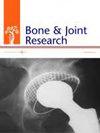A mixed-methods approach exploring acceptability and feasibility of trials designed to test drugs targeting prevention of post-traumatic osteoarthritis after knee injury.
IF 5.1
2区 医学
Q2 CELL & TISSUE ENGINEERING
引用次数: 0
Abstract
Aims To explore key stakeholder views around feasibility and acceptability of trials seeking to prevent post-traumatic osteoarthritis (PTOA) following knee injury, and provide guidance for next steps in PTOA trial design. Methods Healthcare professionals, clinicians, and/or researchers (HCP/Rs) were surveyed, and the data were presented at a congress workshop. A second and related survey was then developed for people with joint damage caused by knee injury and/or osteoarthritis (PJDs), who were approached by a UK Charity newsletter or Oxford involvement registry. Anonymized data were collected and analyzed in Qualtrics. Results Survey responses (n = 19 HCP/Rs, 39 PJDs) supported studies testing pharmacological agents preventing PTOA. All HCP/Rs and 30/31 (97%) PJDs supported the development of new treatments that improved or delayed knee symptoms and damage to knee structure. PJDs thought that improving structural knee damage was more important than knee symptoms. Both groups found studies more acceptable as expected future benefit and risk of PTOA increased. All drug delivery routes were acceptable. Workshop participants (around n = 60) reflected survey views. Discussions suggested that stratifying using molecular testing for likely drug response appeared to be more acceptable than using characteristics such as sex, age, and BMI. Conclusion Our findings supported PTOA drug intervention studies, including situations where there is low risk of disease, no expected benefit of treatment, and frequent treatment administration. PJDs appeared less risk-averse than HCP/Rs. This work reinforces the benefits of consensus and involvement work in the co-creation of PTOA drug trial design. Involvement of key stakeholders, such as PJDs with different risks of OA and regulatory representatives, are critical for trial design success.采用混合方法探讨旨在测试预防膝关节损伤后创伤性骨关节炎药物的试验的可接受性和可行性。
方法对医护人员、临床医生和/或研究人员(HCP/Rs)进行了调查,并在大会研讨会上展示了调查数据。然后,针对膝关节损伤和/或骨关节炎(PJDs)引起的关节损伤患者进行了第二次相关调查,这些患者是通过英国慈善通讯或牛津大学参与登记处联系到的。Qualtrics对匿名数据进行了收集和分析。结果调查回复(n = 19 HCP/Rs,39 PJDs)支持对预防PTOA的药物进行测试研究。所有 HCP/Rs 和 30/31 (97%) PJDs 都支持开发能够改善或延缓膝关节症状和膝关节结构损伤的新疗法。PJDs 认为改善膝关节结构损伤比膝关节症状更重要。随着未来预期获益和 PTOA 风险的增加,这两类人都认为研究更容易被接受。所有给药途径均可接受。研讨会与会者(约 n = 60)反映了调查意见。讨论表明,与使用性别、年龄和体重指数等特征相比,使用分子检测对可能的药物反应进行分层似乎更容易接受。与 HCP/Rs 相比,PJDs 的风险规避程度较低。这项工作加强了在共同创建 PTOA 药物试验设计过程中达成共识和参与工作的益处。关键利益相关者(如具有不同 OA 风险的 PJD 和监管代表)的参与对于试验设计的成功至关重要。
本文章由计算机程序翻译,如有差异,请以英文原文为准。
求助全文
约1分钟内获得全文
求助全文
来源期刊

Bone & Joint Research
CELL & TISSUE ENGINEERING-ORTHOPEDICS
CiteScore
7.40
自引率
23.90%
发文量
156
审稿时长
12 weeks
期刊介绍:
The gold open access journal for the musculoskeletal sciences.
Included in PubMed and available in PubMed Central.
 求助内容:
求助内容: 应助结果提醒方式:
应助结果提醒方式:


